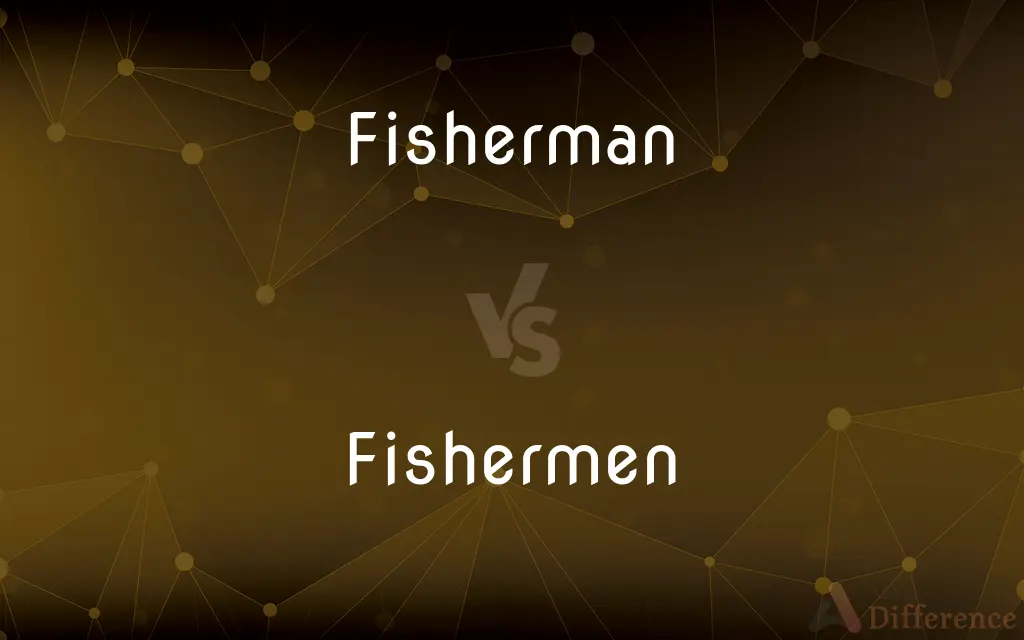Fisherman vs. Fishermen — What's the Difference?
Edited by Tayyaba Rehman — By Maham Liaqat — Updated on April 9, 2024
Fisherman refers to a singular individual who catches fish, while fishermen is the plural form, referring to multiple individuals engaged in fishing.

Difference Between Fisherman and Fishermen
Table of Contents
ADVERTISEMENT
Key Differences
A fisherman is an individual, often using various techniques and tools, to catch fish for recreation, sustenance, or commercial purposes. The term highlights the occupation or hobby of a single person, focusing on the skills and experiences unique to that individual. On the other hand, fishermen encompasses a group of people who share the common activity of fishing. This plural form can refer to a community, team, or any collective of individuals who fish, emphasizing the collaborative or shared aspects of fishing.
While a fisherman's experiences and methods might be unique or specialized, the term fishermen brings attention to the collective experience, techniques shared among a group, and the communal aspects of fishing. For example, discussions about a fisherman might focus on personal achievements, specific fishing methods, or individual stories. In contrast, references to fishermen often concern communal practices, the fishing industry, or the cultural significance of fishing to a community.
The singular term allows for a detailed exploration of the nuances of individual experiences within fishing, including personal strategies, preferences, and contributions to fishing knowledge. Conversely, the plural term fishermen invites discussions on broader topics such as the impact of fishing practices on ecosystems, economic contributions of the fishing industry, and social dynamics within fishing communities.
The distinction also plays a role in legal and regulatory contexts, where regulations might be applied differently to an individual fisherman versus a group or commercial operation represented by fishermen. Additionally, cultural narratives and folklore often distinguish between the lone fisherman and the collective fishermen, imbuing each with different symbolic meanings and roles within society.
Despite their differences, both terms share a fundamental connection to the act of fishing. They reflect different scales and perspectives within the broader context of fishing, from the individual's relationship with the activity to its significance for groups and communities.
ADVERTISEMENT
Comparison Chart
Definition
Singular term for one individual who catches fish.
Plural term for multiple people who catch fish.
Focus
Individual experience, skills, and stories.
Collective experience, industry, community.
Usage Context
Personal achievements, specific methods.
Communal practices, economic impacts, culture.
Cultural Significance
Often depicted as solitary, reflecting on personal journeys.
Emphasizes shared heritage, communal identity.
Regulatory Impact
Regulations may focus on individual practices.
Regulations often address collective practices or commercial operations.
Compare with Definitions
Fisherman
Person skilled in the art of fishing.
As a seasoned fisherman, he knew the best spots for trout.
Fishermen
Group of individuals engaged in the act of fishing.
The fishermen returned at dawn with their catch.
Fisherman
Reflects individual contributions to fishing knowledge.
The fisherman shared techniques perfected over decades.
Fishermen
Refers to people who fish as a collective activity.
Local fishermen collaborate to preserve fish populations.
Fisherman
An individual who catches fish for sport, sustenance, or commerce.
The fisherman spent his early mornings on the tranquil lake.
Fishermen
Plural form highlighting community or team efforts.
Fishermen in the village rely on the sea for their livelihood.
Fisherman
Singular noun emphasizing the occupation or hobby.
Every fisherman has his favorite type of bait.
Fishermen
Addresses the broader impact of fishing on society.
Fishermen contribute significantly to the local economy.
Fisherman
Often portrayed in literature and culture as connected with nature.
The fisherman's tale was one of adventure and solitude at sea.
Fishermen
Symbolizes a shared cultural or economic identity.
Stories of the fishermen's bravery during storms are legendary.
Fisherman
A fisher or fisherman is someone who captures fish and other animals from a body of water, or gathers shellfish.Worldwide, there are about 38 million commercial and subsistence fishers and fish farmers. Fishers may be professional or recreational.
Fishermen
One who fishes as an occupation or for sport.
Fisherman
A person who catches fish for a living or for sport.
Fishermen
A commercial fishing vessel.
Fisherman
One who fishes as an occupation or for sport.
Fishermen
Plural of fisherman
Fisherman
A commercial fishing vessel.
Fisherman
A fisher, a person engaged in fishing:
Fisherman
Any person who attempts to catch fish.
The fisherman cast his line.
Fisherman
A person whose profession is catching fish.
He is a fisherman, out on a trawler for days at a time.
Fisherman
A vessel (boat or ship) used for fishing.
Fisherman
One whose occupation is to catch fish.
Fisherman
A ship or vessel employed in the business of taking fish, as in the cod fishery.
Fisherman
Someone whose occupation is catching fish
Common Curiosities
What equipment might a fisherman use?
A fisherman may use rods, nets, traps, or spears, depending on the fishing method and target species.
What challenges do fishermen face?
Fishermen face challenges like overfishing, climate change, pollution, and changing market demands, impacting their livelihoods and the sustainability of fish stocks.
How do fishermen contribute to conservation?
Many fishermen participate in conservation efforts, such as catch-and-release practices, habitat restoration, and sustainable fishing quotas to protect aquatic ecosystems.
Can the term fisherman apply to women?
Yes, the term fisherman can apply to anyone who fishes, regardless of gender, though some may prefer gender-neutral terms like "angler" or "fisher."
What is the economic impact of fishermen?
Fishermen contribute to the economy through the commercial fishing industry, supporting jobs in processing, distribution, and retail, as well as through recreational fishing, which supports tourism and related industries.
What legal regulations affect fishermen?
Fishermen are subject to various local, national, and international regulations that govern fishing seasons, permissible catch sizes, quotas, and the types of gear that can be used to ensure sustainable practices.
How do fishermen learn their trade?
Fishermen often learn through hands-on experience, mentorship from seasoned fishermen, and increasingly through formal education programs focused on marine biology, conservation, and sustainable fishing techniques.
Are there communities where fishermen play a central role?
Yes, in many coastal and riverside communities, fishermen play a central role in the local economy, culture, and social structure, often passing down traditions and knowledge through generations.
How is the lifestyle of a fisherman?
The lifestyle of a fisherman can vary widely, from those who fish recreationally, enjoying the peace and solitude of the activity, to commercial fishermen who work in challenging and often dangerous conditions to make a living.
How do fishermen adapt to environmental changes?
Fishermen adapt to environmental changes by modifying fishing techniques, targeting different species, participating in conservation efforts, and diversifying their income sources to reduce reliance on depleted fisheries.
Share Your Discovery

Previous Comparison
Ait vs. Wait
Next Comparison
Vogues vs. CoguesAuthor Spotlight
Written by
Maham LiaqatEdited by
Tayyaba RehmanTayyaba Rehman is a distinguished writer, currently serving as a primary contributor to askdifference.com. As a researcher in semantics and etymology, Tayyaba's passion for the complexity of languages and their distinctions has found a perfect home on the platform. Tayyaba delves into the intricacies of language, distinguishing between commonly confused words and phrases, thereby providing clarity for readers worldwide.
















































